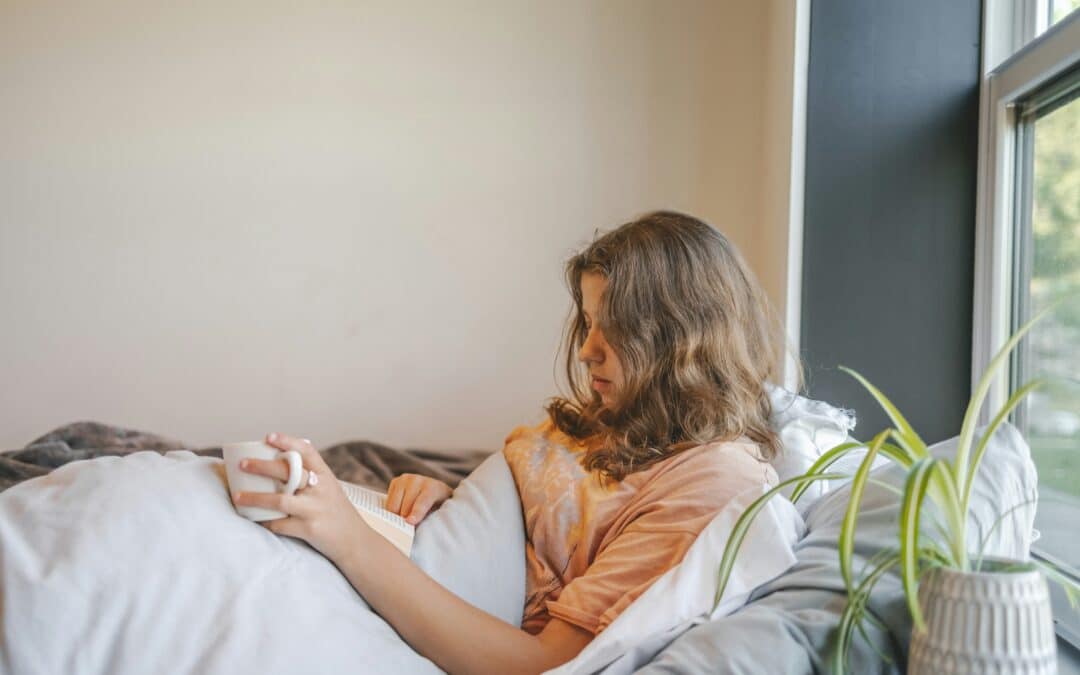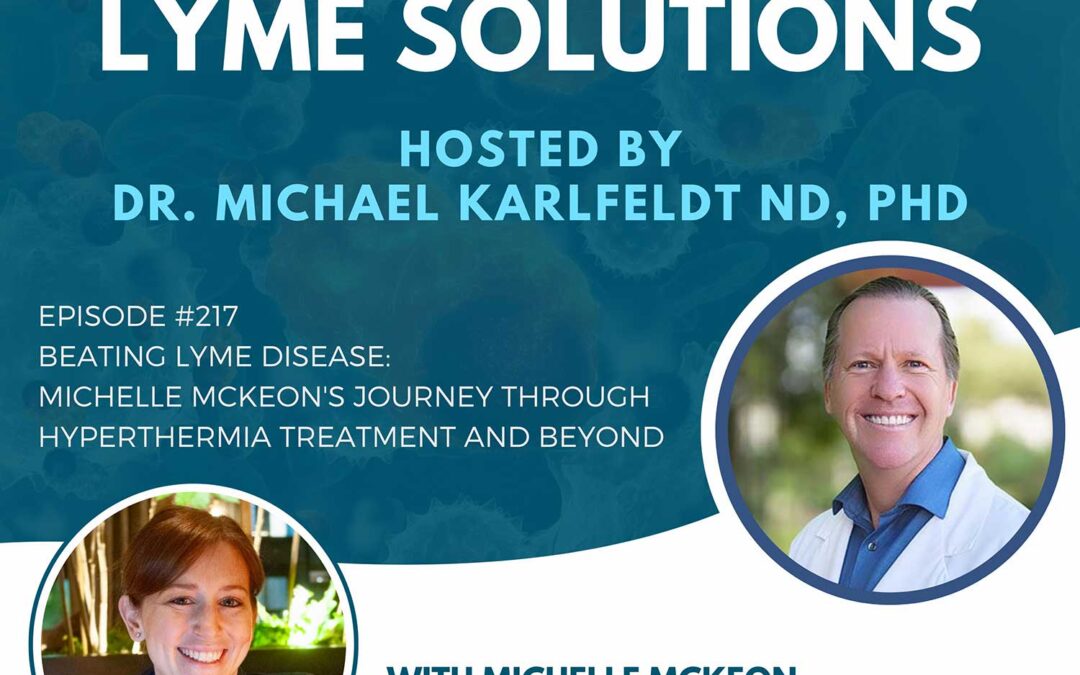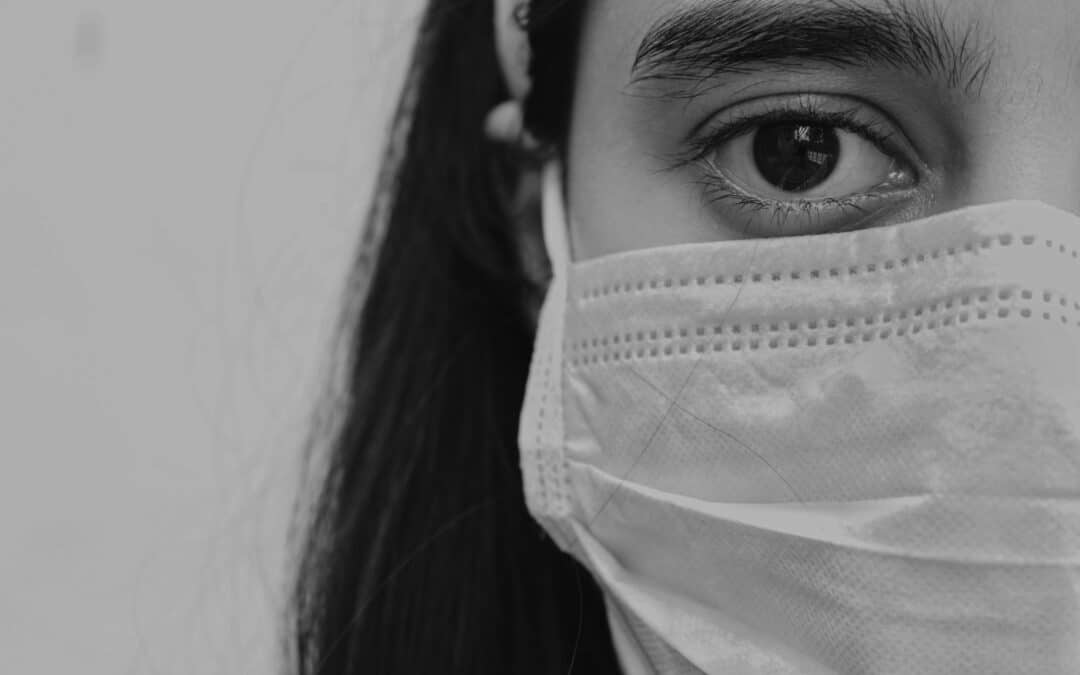Authored by Michelle Mckeon
A little over two years ago, I remember looking at myself in the mirror and trying to figure out who the person was that was staring back at me. Growing up I felt that while I had my insecurities at times, my sense of self had always been strong. What was happening to me? I wondered. Not only did I feel completely disconnected from my body, but my friends and family did not look familiar either.
I was suffering from late stage Neurological Lyme disease. My particular strain of Lyme disease was called Lyme Encephalopathy. After having Lyme disease for five and a half years and trying numerous treatments that my body didn’t respond to, I began to decline rapidly enabling the virulent disease to completely invade my brain. The symptoms that I experienced at this time were severe head pressure, fatigue, brain fog, muscle paralysis, light, heat, and noise sensitivity, anxiety, depression, the inability to process information or focus, and vertigo that literally turned my world upside down.
At that point my doctors informed me that my best chance of getting my life back, would be to undergo whole-body hyperthermia treatment at a clinic in Germany. Lyme disease is a bacterial illness caused by a bacterium known as a spirochete. Spirochetes cannot tolerate heat and therefore die at high temperatures. Essentially, hyperthermia involves overheating the body to kill spirochetes. I can remember it was right before Thanksgiving and I was sitting in the doctor’s office with the image of my body being cooked like a turkey in the oven. Only, I was the turkey. Naturally, I was terrified! However, fortunately hyperthermia treatment is far different than the image that I conjured up in my head.Hyperthermia is actually a safe procedure with a high success rate in treating patients with Lyme disease and with cancer.
The night before I left for Germany, my friends and family came over to spend time with me. I remember studying them and trying to form a connection with who they were in my life. It was as if the Lyme had clouded over my brain and while I knew that the memories were still somewhere in there, as hard as I tried, I was unable to recall why they were some of the closest people in my life. That right there told me how far gone I really was in this disease and how badly I needed this treatment to work.
Hyperthermia Treatment in Germany:
The next day my mom and I flew to an airport in Munich, where a shuttle came to drive us to the St. Georg Klinik in Bad Aibling, Germany. Shortly after our arrival, we met with a team of physicians. The physicians assigned to me inquired about my history with Lyme disease and my general state of health. They additionally collected any medical records that I brought and then spoke about the treatment schedule that I would be receiving over the next twelve days. Jet-lagged, dizzy, and exhausted from the flight, I laid down and felt a glimpse of hope as they left the room.
During my stay, the clinic kept me very busy. The first few days they prepped my body for whole-body hyperthermia treatment (WBHT) with various tests and detoxification therapies. The tests included an abdominal ultrasound to check for any possible masses that may or may not have been realized, CD 56/57 test, urine test, lung function test, EKG, echocardiogram, darkfield testing, and a Lyme symptom questionnaire. I also began detoxification treatments consisting of IVs of Vitamin C, Glutathione, and EDTA. Other treatments that received were ozonization of blood, green and red laser light therapy, and a colonic the day before each WBHT. In addition to these, I had infusions of Rocephin given daily, and mineral infusions of magnesium, calcium, and selenium. Adjunct therapies are also a big part of the schedule, so during this time I received magnetic field treatments with singulet oxygen and ionizing footbaths.
It was a very full schedule from the time I woke up until the time I ate dinner. However, it was really nice being an inpatient where the complete focus for those two weeks was all about getting better. I also became close with many of the other patients at the clinic, as we saw each other everyday and ate most all of our meals together. There was a lot of comfort in speaking with others who were going through a similar experience that I was. As many of you know, Lyme is a very misunderstood and lonely disease. So, being around people that I could relate to, encouraged me to feel more supported during this process.
Whole-body Hyperthermia Procedure:
After a few days of detoxification and adjunct therapies, I received my first WBHT. The clinic has a special unit that is well equipped and staffed and operates similar to an intensive care unit. The WBHT lasted approximately six hours and I was put in a twilight sleep so that I wouldn’t be awake during the procedure. A rectal thermometer and catheter was applied to monitor my body temperature and kidney function. My body’s core temperature was increased carefully through the use of whole body infra-red-A-irradiation and held at progressive temperatures until approximately 107°F (41.67°C) was reached. This peak temperature was held for 60-90 minutes and then the temperature slowly decreases. The goal was to bring my body above at least 105 degrees (the temperature at which it is believed most strains of Borreliosis are affected). However, up to 107°F + (41.6°C +) is preferable, if the patient can handle it. This higher temperature is more desirable as it has a better chance of eradicating more strains of Borreliosis and other pathogens that are likely causing illness.
During this time, I was given insulin potentiated Rocephin. Insulin starved the cells of sugar, particularly the cells that were infected with pathogens. This is done so that when the antibiotic enters your system along with a bit of glucose, the antibiotic is targeted to the cells that need glucose the most. These are the Lyme and other anaerobic co-infected cells. This process allows Rocephin, being primarily an extracellular antibiotic, to become effective in the cells too. In addition to Rocephin, patients are now also given Flagyl during the WBHT to attack the cyst form of Lyme.
The WBHT started at about 8:30 in the morning and continued until around 3:00 in the afternoon. When the treatment was finished, I was taken to a private recovery room, which was close to the nurses’ station. Here, the doctors would continually come in to check up and monitor me. They also made sure that I was receiving electrolytes intravenously to aid my body in the recovery process.
Hyperthermia Treatment for Cancer:
For centuries, fever therapy has been known to have a significant healing effect. Many clinics that use hyperthermia treatment on patients with Lyme also use this therapy to treat patients with cancer. As you heat up cancer tissues, heat shock proteins are created, in which direct immunological mechanisms of defense against cancer cells occur. This procedure is done with irradiation or chemotherapy for patients and the technique allows much smaller amounts of chemo (one tenth of a normal dose) to be used with an even greater effect in targeting cancer cells. Using a lower dose of chemotherapy is very beneficial because it allows the patient to become less toxic. Also, after chemotherapy or irradiation, repair mechanisms in the cancer tissue become impaired by hyperthermia. Additionally, hyperthermia treatment aids in boosting one’s immune system.
Local surface hyperthermia and local hyperthermia treatments are also offered to patients with cancer. The local surface hyperthermia is used specifically for superficial tumors such as skin cancers, superficial lymph nodes and metastases of the skin, and the muscles of different primary tumors. In this therapy method, the heat is generated with a water-filtered infrared radiation source (infrared A), which enables penetration into the tissue to a depth of around 1 inch. In local hyperthermia, short wave irradiation is used to heat up cancer tissue or metastases and penetration depth is about 7 inches. In the tumor tissue, temperatures are able to reach higher than 107.6°F (42°C). While cells that are healthy can withstand this treatment, malignant cells become damaged. Also, there are no significant side effects and during local hyperthermia a patient can rest on a warm waterbed.
What to Expect After Hyperthermia Treatment:
After the WBHT you may experience discomfort. Personally, I felt like I had just run a marathon and was extremely exhausted. The clinic offered me both homeopathic and pharmaceutical options if needed. However, I don’t remember taking anything, as all I wanted to do was sleep. When I woke up the next morning, the nurses removed my catheter and I resumed my regular eating routine as well as my IV and adjunct treatment schedule. About six days later, I received my second WBHT. I ended up having to push my second WBHT back a day because I was experiencing flu like symptoms from a herxheimer reaction. I cannot emphasize enough how important detoxification is in the recovery process. After my second WBHT, I had a few more days of follow up IVs and adjunct treatments before being discharged.
When I arrived home from the clinic, I only felt a little bit better. I was still experiencing the majority of my symptoms and I was still completely debilitated. It was devastating to not have a functioning brain at the age of 24. Your early twenties are supposed to be all about finding out who you are and discovering your independence. While all of my friends were moving on with their lives with exciting careers, relationships, and travel experiences, I felt like I was stymied. I could not accept that this might be my reality for the rest of my life.
I did not understand why I had come back only feeling minimal symptom relief, while others who I had connected with that had gone through WBHT for Lyme had noticed more significant improvements upon their return. The one thing that did happen when I got home was that every day I started noticing little improvements. This was something that I held on to and that continually gave me hope. One of my biggest concerns was that the disease had gone too far and that I was too sick to come back from this. These little improvements that I noticed everyday told me that my body was responding to the treatment and that maybe this was not all permanent.
Post-hyperthermia Detox Treatments:
Around this time, I was put in touch with another person who had gone to the clinic for the treatment of Lyme disease. He directed me in a post-treatment protocol that he had done when he returned from Germany. He explained that he did a pre-treatment protocol to assist his body in better tolerating the treatment while in Germany. He helped me understand that the toxic load in every individual can differ greatly, which is why peoples’ levels of improvement vary considerably upon initially returning from Germany. When your body is heated up, it releases many toxins both from the organisms that die during the treatment and from environmental pollutants/heavy metals. However, when these toxins are lessoned, the body can fight pathogens more effectively and aid in the reduction or elimination of negative symptoms.
While WBHT kills a lot of pathogens, it is not believed that it kills everything. Therefore, it is equally important to attempt to eradicate both known and unknown pathogens that are left after WBHT with a few herbal anti-microbials. These herbs were apart of the post-treatment protocol. Additionally, various supplements to provide nutritional and detoxification support were suggested. Also, even after a very effective anti-Lyme therapy, there may be other factors in the recovery process.
Another key component of this protocol was getting Candida (yeast overgrowth) under control. Almost everyone that has Lyme disease and/or co-infections, whether they realize it or not, is dealing with a Candida issue. A specific herb was recommended for this along with a special diet. This diet consisted of low sugar, low carbs, and mainly gluten and dairy free foods. When dealing with Candida one needs to both starve the organisms with a low sugar diet and reduce the numbers with antifungal herbs. This diet also encourages the consumption of good fats and omegas to help the brain and other cells in the body to work properly. Unfortunately, at this time I realized that hyperthermia treatment was not going to be a silver bullet like I had hoped and that it was going to take time and a lot of detox therapies to see the benefits of the treatment. After mulling over this, I was adamant about getting my life back and had made sure that I did some type of detoxification therapy everyday.
Cell Membrane Repair IVs:
Twice a week I went to an infusion center to get specific IVs. There is a strong correlation between neurotoxins resulting in an accumulation of very long chain fatty acids (VLCFAs). This leads to the destabilization of the cell membrane phospholipid structure. Toxins affect the long chain fatty acids by making them become even longer. This disrupts the signals being sent to the cell membranes, which results in the brain receiving mixed signals and creating various neurological issues. Detoxification and cell membrane repair occurs through these infusions. In turn, neuroinflammation decreases and membrane function begins to stabilize and as the fog begins to clear, you can start to regain control of your thoughts.
Slowly I felt like I was coming back to life and coming into my body. Basic things like sarcasm or social skills were becoming more natural. I noticed that reading and writing became easier as my focus and processing progressed. My vision, brain fog, head pressure, anxiety, depression, and light, heat, and noise sensitivity symptoms were all slowly improving as well. For the first time, my body was responding to treatment and my hope for my future grew. I continued with the post-treatment, which now included more detox therapies. I would go to an infrared sauna twice a week, sweat off toxins twice a week in a detox bath, and also did coffee enemas every week. Every single time I did a detox therapy I felt better.
This I found especially interesting. I realized that before I went to Germany for WBHT, I did not notice improvements when I detoxed. Therefore, I didn’t really understand how significant it was in the recovery process. Sometimes I actually felt worse from detoxing. However, when I came back from Germany my body started tolerating and responding well to the detox therapies. This told me that with less of a pathogenic load in my system, my body was probably able to better tolerate these therapies to move me in the right direction.
Retesting for Tick-borne Infections:
Later on that year, I ordered two tests from Fry laboratories, a highly reputable laboratory for tick born infections. I requested a Bartonella test and Protozoa Rheumatica test, which both came back negative. This was very telling because before I received WBHT, both tests showed that I had a substantial amount of each co-infection in my blood. This was very exciting news! Though, it was also a little confusing. While I knew that I had come a long way, I was still dealing with symptoms and felt that I had to be missing something.
Methylation, Mold, and Moving Forward:
It wasn’t until I finally moved out of my apartment that my improvement started going at faster pace. At that time I was having various tests done for mold and methylation issues. Apparently, many people with Chronic Lyme disease have a gene known as the HLA gene that is unable to process mytotoxins from mold. As a result of a predisposition to poor detoxification, an environment was created in my body that enabled microbial overgrowth. This I want to mention can be, and was for me, a huge barrier in the recovery process that many people overlook. After doing some testing it was apparent that my old apartment had a mold issue that I wasn’t aware of. I kept my apartment very clean and there wasn’t any mold that I could see, but now I know that many times that doesn’t matter. Many of the infusions and supplements on the post-treatment regiment actually treat mold. Therefore, the biggest change was getting out of my living environment and moving into a new place. Adding some supplements for methylation support was also very helpful.
I have come a very long way since receiving WBHT and I honestly contribute it to saving my life. Unfortunately, the disease had completely invaded my brain before I left for Germany. For this reason, I had a more difficult road and a longer post-treatment than many Lyme suffers who undergo WBHT. Looking back and remembering how I was at my worst, I had lost all of my confidence and my life was completely controlled by this disease. Through hyperthermia treatment and the various post-treatment therapies, I am able to experience a much happier life. While I still deal with some symptoms, they are a lot more manageable. I have yet to see a plateau and I continue improving. There is hope in getting better and today when I look in the mirror my sense of self is becoming permanent.




